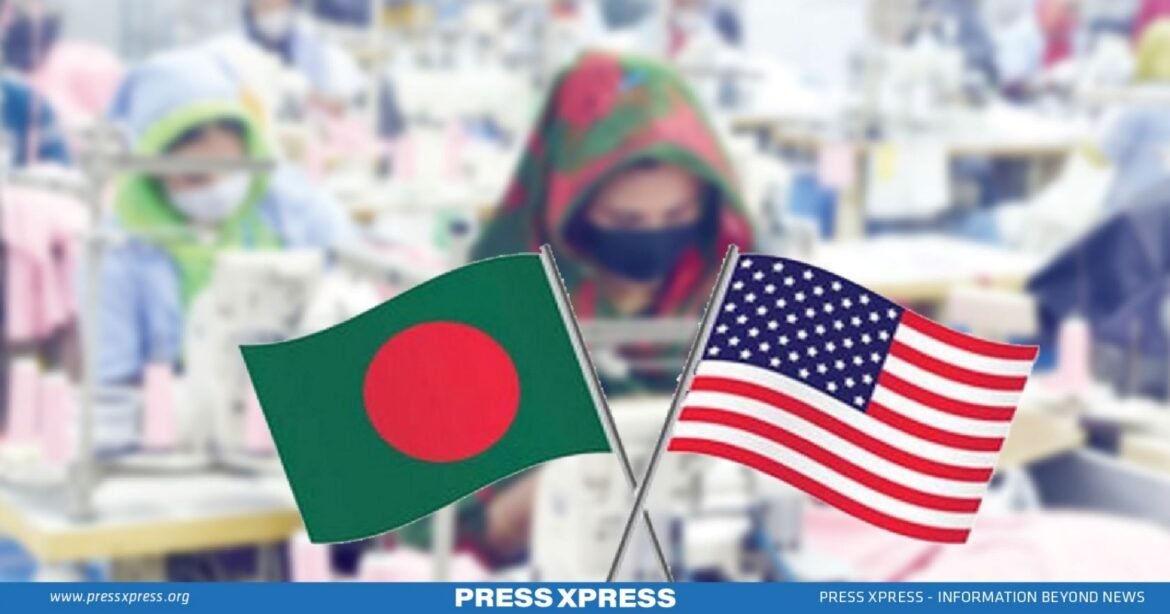Bangladesh is poised to assertively champion the cause of securing duty-free access for its RMG products in the expansive US market. The issue is going to be raised by the officials at the forthcoming Trade and Investment Cooperation Forum Agreement (TICFA) meeting slated for Wednesday, September 20, 2023, in Dhaka.
During the pivotal meeting, Washington’s scrutiny may extend toward matters concerning democracy and human rights within the confines of Bangladesh.
You can also read: Women in Bangladesh’s RMG Industry in Leaving Row
Journey to restore GSP privileges
Harking back to the antecedent TICFA meeting convened on December 6, 2022, in the heart of Washington, Bangladesh fervently advocated for duty-free privileges for its burgeoning garment exports destined for the shores of the United States. This resolute appeal remains etched in the annals of bilateral trade aspirations.
Reliable sources have affirmed that Bangladesh will resoundingly reiterate its call for preferential market treatment. Anticipating the pivotal meeting, the Ministry of Commerce spearheaded an inter-ministerial conclave on Monday, September 18, 2023.
A high-ranking official at the commerce ministry disclosed that Bangladesh will tenaciously seek bolstered backing to continue availing the trade benefits accorded to Least Developed Countries (LDCs). In this gateway, even in the wake of its forthcoming elevation to developing country status in 2026, Bangladesh will seek to ensure its recent favourability in the upcoming days too.
Sealed on November 25, 2013, the Trade and Investment Cooperation Forum Agreement (TICFA) between Bangladesh and the United States was envisioned as an annual forum for dismantling impediments hindering the surge of bilateral trade and investment. Yet, a lamentable absence of discernible headway has shadowed the preceding six TICFA gatherings, leaving a pressing imperative for substantive progress on the horizon.
The genesis of the Trade and Investment Cooperation Forum Agreement (TICFA) traces back to June 2013 when Washington, in the wake of the Rana Plaza tragedy, suspended Bangladesh’s Generalized System of Preferences (GSP) privileges. Subsequently, the United States unveiled a comprehensive 16-point agenda. These points were aimed at bolstering workers’ safety and upholding the rights of apparel laborers within Bangladesh.
Official reports affirm that the majority of the 16-point plan of action has been diligently implemented by the government. However, Bangladesh finds itself still in pursuit of the reinstatement of its GSP benefits, despite repeated appeals falling on unresponsive ears.
Labor rights, child labor eradication, and IP protection to get priority
Within the corridors of the Commerce Ministry, insider sources reveal Bangladesh’s resolute quest for preferential trade provisions in the expansive US market. This encompasses fervent appeals for tariff exemptions on exports, especially concerning the flourishing ready-made garments sector. Dhaka’s determination to advocate for these matters will find a prominent platform in the upcoming TICFA meeting.
A particular point of contention centers around Dhaka’s fervent desire for the duty-free export of garments crafted from cotton sourced from the United States. This issue has previously encountered obstinate resistance from the US. Yet, Dhaka remains undeterred and is poised to raise it anew during the imminent TICFA encounter.
Currently, Bangladesh grapples with a hefty 15.62 percent duty levied on its garment exports, a burden it seeks to alleviate through negotiations.
Conversely, the United States seeks swift resolutions to the intricate facets of labor conditions, labor rights, the eradication of child labor, the empowerment of garment workers to form unions, and the safeguarding of intellectual property rights.
Furthermore, the United States exhibits a keen interest in probing the democratic landscape and human rights terrain within Bangladesh. If the US chooses to broach these subjects during the impending meeting, Bangladesh stands prepared with a robust response. This will signify the gravity of the discussions set to unfold.
Six-point agenda: Bangladesh’s vision for the future in TICFA
At the helm of Bangladesh’s delegation, Senior Secretary of the Ministry of Commerce, Tapan Kanti Ghosh, will steer the nation’s course in the impending meeting. On the opposing side, Christopher Wills, the US Trade Representative, along with the Assistant US Trade Representative for South and Central Asian Affairs from the Office of the US Trade Representative, will spearhead the American contingent.
Ghosh elucidated that Bangladesh fervently seeks collaboration from its paramount trade partner, the United States, leveraging the formidable platform of TICFA. This alliance is envisioned as the linchpin in surmounting the hurdles that loom large over Bangladesh’s transition from a less developed country (LDC), ultimately propelling the nation towards the attainment of sustainable development goals (SDGs).
In the crucible of negotiations, the US delegation may interject with critical concerns encompassing the export of cotton, the safeguarding of trade union rights for apparel workers, avenues for foreign investment within the insurance sector, and the issue of subsidies on rice exports.
In the aftermath of the dual industrial catastrophes, namely the Tazreen fire and the Rana Plaza collapse, the United States, on June 27, suspended Bangladesh’s GSP privileges. This critical move, while excluding garment exports, effectively curtailed duty-free access for a staggering 97 percent of Bangladesh’s export items.
Sources within the meeting divulged that Bangladesh stands resolute in its stance against permitting the import of US cotton sans fumigation. This position aligns with established practices in India, Pakistan, and Sri Lanka, rooted in legal obligations.
As the meeting unfolded, Bangladesh fixed a comprehensive agenda, numbering six key focal points. Among these are entreaties for support in the graduation process, preferential market access, facilitation of the Trade Facilitation Agreement (TFA), channels for US investment, technology transfer, and capacity building in trade-related domains. Responsible business conduct and ethical procurement practices further headline Bangladesh’s compelling propositions.
Recently, US Ambassador to Dhaka, Peter Haas, conveyed his optimism regarding the potential for swift progress in forging bilateral trade and investment ties between Bangladesh and the United States. This pronouncement underscores the shared determination to chart a course toward mutually beneficial economic collaboration.


